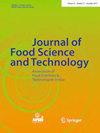The molecular and analytical methods reveal aflatoxin B1-producing Aspergillus flavus isolated from ready-to-eat peanut samples are resistant to the antifungal agent methyl-thiophanate
IF 3.3
3区 农林科学
Q2 FOOD SCIENCE & TECHNOLOGY
引用次数: 4
Abstract
The peanut is a product of high nutritive value and an economically important crop. However, peanuts can be contaminated during storage with Aspergillus flavus, which produces aflatoxins. In humans, aflatoxins can cause hepatocellular carcinoma. Exposure of animals to aflatoxins can result in weight loss and generate residues in meat and milk. The objective of this study was to isolate and identify aflatoxigenic fungi, to quantify the production of aflatoxin B1, and to correlate its production with resistance to the antifungal agent methyl-thiophanate (MT) in ready-to-eat peanuts samples. Nine of the 50 samples selected were found to be contaminated with A. flavus by PCR amplification of the ITS region. In addition, three genes of the aflatoxin B1 biosynthesis pathway were amplified. HPLC analysis revealed that the isolates produced high levels of aflatoxins ranging from 4 to 285 μg/mL. Furthermore, the isolate producing the highest concentration of aflatoxin (285 μg/mL) exhibited the highest resistance to antifungal MT (MIC ≥ 250 μg/mL), factors that might be related. The present results confirm the presence of aflatoxin-producing fungi resistant to MT in peanut samples, which may pose health risks to consumers.分子和分析方法表明,从即食花生样品中分离得到的产生黄曲霉毒素b1的黄曲霉对抗真菌剂甲基硫代酸盐具有耐药性
花生是一种营养价值高的产品,也是一种重要的经济作物。然而,花生在储存过程中可能被黄曲霉污染,黄曲霉会产生黄曲霉毒素。在人类中,黄曲霉毒素可引起肝细胞癌。动物接触黄曲霉毒素会导致体重下降,并在肉和牛奶中产生残留物。本研究的目的是分离和鉴定产黄曲霉毒素的真菌,量化黄曲霉毒素B1的产量,并将其产量与即食花生样品中抗真菌剂甲基硫代盐(MT)的耐药性联系起来。经ITS区PCR扩增,50份样品中有9份被黄曲霉污染。此外,还扩增了黄曲霉毒素B1生物合成途径的3个基因。高效液相色谱分析表明,分离菌株的黄曲霉毒素含量在4 ~ 285 μg/mL之间。产黄曲霉毒素浓度最高(285 μg/mL)的菌株对抗真菌MT的耐药性最高(MIC≥250 μg/mL),可能与此有关。目前的结果证实花生样品中存在抗MT的黄曲霉毒素产生真菌,这可能对消费者构成健康风险。
本文章由计算机程序翻译,如有差异,请以英文原文为准。
求助全文
约1分钟内获得全文
求助全文
来源期刊
CiteScore
7.70
自引率
0.00%
发文量
274
审稿时长
11 months
期刊介绍:
The Journal of Food Science and Technology (JFST) is the official publication of the Association of Food Scientists and Technologists of India (AFSTI). This monthly publishes peer-reviewed research papers and reviews in all branches of science, technology, packaging and engineering of foods and food products. Special emphasis is given to fundamental and applied research findings that have potential for enhancing product quality, extend shelf life of fresh and processed food products and improve process efficiency. Critical reviews on new perspectives in food handling and processing, innovative and emerging technologies and trends and future research in food products and food industry byproducts are also welcome. The journal also publishes book reviews relevant to all aspects of food science, technology and engineering.

 求助内容:
求助内容: 应助结果提醒方式:
应助结果提醒方式:


